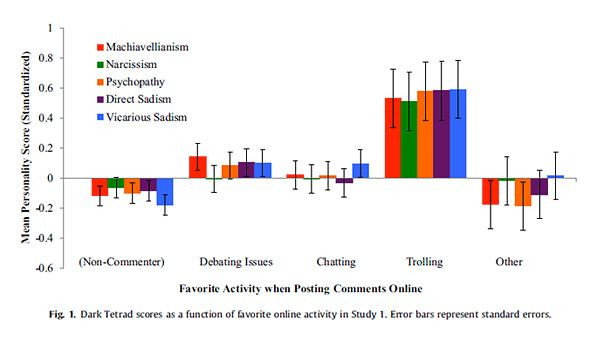Internet Trolls Are Truly The Darker Side Of The Internet, Usually Sadists And Narcissists

Looking through the comments section of webpages can often be more entertaining than the article's actual contents. They’re usually filled with opposing views, stories, and jokes, but the most entertaining comments usually come from the Internet troll, that person who deliberately posts a provocative comment to elicit an argument and disrupt potentially informative conversations. What kind of horrible people would do this? A new study knows exactly who.
Chances are you’ve come across a troll or two during a time of Internet exploration. A perfect example of a troll’s comment is this one from a YouTube video in which a woman being proposed to accidentally knocks the ring into a lake:
Excellent. Another woman saved from the death-grip of the patriarchy: marriage. No doubt that the woman intentionally knocked the ring out of his hand, as she knew that if she said "no" to the proposal, she would be beaten and murdered, as men typically tend to do when told "no." Knocking the ring into the water allowed her to delay the fatal proposal until she could flee far, far away.
For a video about a woman’s klutziness, it’s not only odd that a commenter would bring up the issue of domestic violence and murder, it’s uncalled for. A 2013 study found that through exaggerating, lying, and name calling, trolls had the power to polarize people commenting on a subject. In other words, if you take a group of people discussing ideas, and then insert a troll into the conversation, those who feel one way become more steadfast in their ideology — the same goes for the other side. But why do it in the first place? The new study finds that the answer is in a person’s personality.
For their study, they had 1,215 people complete personality tests and asked them to rate their agreement with comments like “I like to troll people in forums or the comments section of websites” and “I enjoy griefing players in multiplayer games,” which were part of the so-called Global Assessment of Internet Trolling test. Their intent was to see how much trolling behavior was associated with the darker sides of personality, known as the Dark Tetrad, and comprising of Machiavellianism (to deceive and manipulate others), narcissism, psychopathy (a lack of remorse), and sadism (pleasure in others’ misfortune).
Their results showed that trolls are truly horrible people, scoring high in all four personality traits, and much higher than those who never commented in forums, those who debated issues, and those who chatted. “Of all personality measures, sadism showed the most robust associations with trolling and, importantly, the relationship was specific to trolling behavior,” the researchers wrote, calling trolling “an Internet manifestation of everyday sadism.”

Although comments sections are more moderated now than ever — The Huffington Post has people dedicated to that and YouTube allows users to disable comments — the study shows that there’s really no swaying Internet trolls to be better people. Their purpose on the Internet is strictly to bring frustration to every person who tries to refute their comments. So, save yourself some time and happiness, and ignore them.
Source: Buckels E, Trapnell P, Paulhus D. Trolls just want to have fun. Personality and Individual Differences. 2014.



























